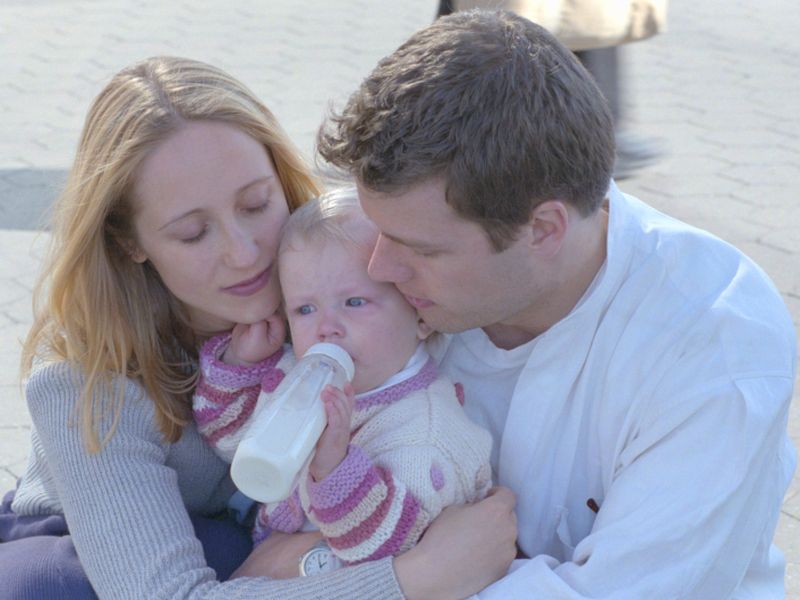

Treat Autism Even Before Symptoms Show?
Small study found 'at-risk' babies did better if therapists trained parents to communicate more effectivelyThursday, May 11, 2017

THURSDAY, May 11, 2017 (HealthDay News) -- Treating emerging signs of autism in young babies who are at high risk for the disorder helped improve their attention, language, communication and social skills, preliminary research shows.
In the first study of its kind, British researchers used months of video feedback to help the parents of 28 infants -- at high risk of autism because a sibling has the disorder -- understand and respond to their baby's individual communication cues.
The children were tracked until they were 3 years old, an age at which autism symptoms often surface.
"We wanted to see the downstream effects on this kind of development and see it play out over the next few years," said study author Dr. Jonathan Green. He's a professor of child and adolescent psychiatry at University of Manchester.
"By the end of treatment, babies in the treatment group showed an impact of therapy," he added. "That improvement was sustained after treatment . . . the change carried on."
About 1 in 68 children in the United States are affected by autism spectrum disorder, according to the U.S. Centers for Disease Control and Prevention. Symptoms vary, but typically include difficulties in behaving, communicating or interacting with others. Repetitive behaviors and obsessions also characterize the developmental disorder.
Green and his team split 54 families with an at-risk baby into two groups. Twenty-eight families were randomly selected to receive an average of nine home-based visits from a therapist.
The therapist used video feedback to help parents adapt to their baby's communication style. Parents used this information to improve their baby's attention, communication, early language development and social engagement.
These infants underwent treatment for five months, from ages 9 months to 14 months. They were later evaluated at ages 15 months, 27 months and 39 months.
About 1 in 5 babies considered at high risk for autism because a sibling is affected actually goes on to develop the disorder, according to Green. None of babies receiving therapy showed any "clear signals" indicating they would definitely develop autism.
The parents' video feedback training "really sensitized them to the subtle and interactional communication signals their babies were giving them, and we think these signals are slightly off-kilter in babies at risk for autism," Green explained.
"What we helped these [parents] do was get back in a normal groove with the baby," he added. "It involves eye contact, though doesn't teach it, helping the parent watch and wait, and when the baby signals, then to respond."
Thomas Frazier is the chief science officer for the advocacy organization Autism Speaks. He praised the study as "totally unsurprising, but really useful research.
"Skills that are behavior-based are important for any child's development, but particularly for children with autism -- [including] how to reinforce and shape behaviors," Frazier said. "These kinds of skills aren't specific to autism, but children with autism struggle with these things -- their parents have to get them to engage and direct their attention. This essentially allows the parent to become the therapist."
Green and Frazier agreed that more research is needed to both confirm the results and extend them to larger study groups.
"Because this is was a relatively small, first-stage trial, it needs to be done on a bigger scale, with maybe 200 babies," Green said. "If there are good effects, then I'd be suggesting this [intervention] should go into clinical practice."
The study was to be presented Wednesday at the International Meeting for Autism Research, in San Francisco. Research presented at scientific conferences typically hasn't been peer-reviewed or published, and results are considered preliminary.
SOURCES: Jonathan Green, M.B.B.S., professor, child & adolescent psychiatry, University of Manchester, England; Thomas Frazier, Ph.D., chief science officer, Autism Speaks, New York City; May 10, 2017, presentation, International Meeting for Autism Research, San Francisco
HealthDay
Copyright (c) 2017 HealthDay. All rights reserved.
News stories are written and provided by HealthDay and do not reflect federal policy, the views of MedlinePlus, the National Library of Medicine, the National Institutes of Health, or the U.S. Department of Health and Human Services.
- More Health News on
- Autism Spectrum Disorder




























.png)











No hay comentarios:
Publicar un comentario